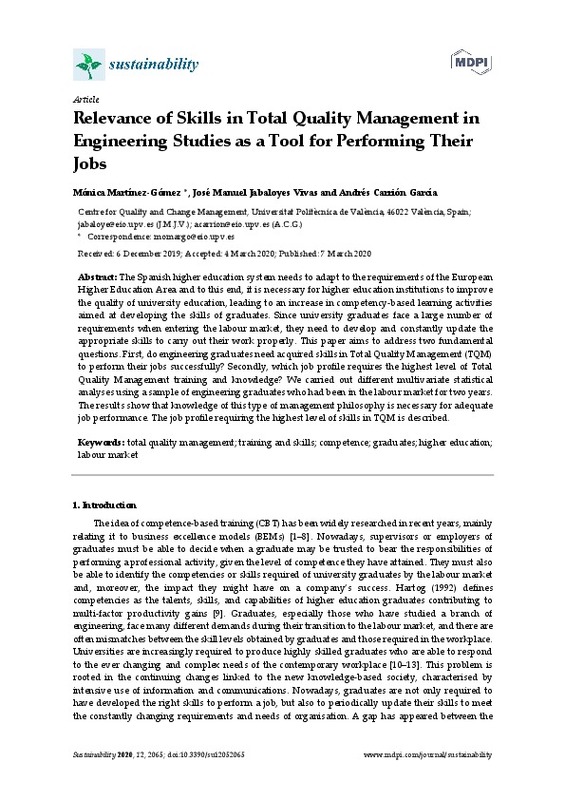Kanji, G. K., Malek, A., & Tambi, B. A. (1999). Total quality management in UK higher education institutions. Total Quality Management, 10(1), 129-153. doi:10.1080/0954412998126
Heijke, H., Meng, C., & Ramaekers, G. (2003). An investigation into the role of human capital competences and their pay‐off. International Journal of Manpower, 24(7), 750-773. doi:10.1108/01437720310502113
Jaca, C., & Psomas, E. (2015). Total quality management practices and performance outcomes in Spanish service companies. Total Quality Management & Business Excellence, 26(9-10), 958-970. doi:10.1080/14783363.2015.1068588
[+]
Kanji, G. K., Malek, A., & Tambi, B. A. (1999). Total quality management in UK higher education institutions. Total Quality Management, 10(1), 129-153. doi:10.1080/0954412998126
Heijke, H., Meng, C., & Ramaekers, G. (2003). An investigation into the role of human capital competences and their pay‐off. International Journal of Manpower, 24(7), 750-773. doi:10.1108/01437720310502113
Jaca, C., & Psomas, E. (2015). Total quality management practices and performance outcomes in Spanish service companies. Total Quality Management & Business Excellence, 26(9-10), 958-970. doi:10.1080/14783363.2015.1068588
Chen, R., Lee, Y.-D., & Wang, C.-H. (2018). Total quality management and sustainable competitive advantage: serial mediation of transformational leadership and executive ability. Total Quality Management & Business Excellence, 31(5-6), 451-468. doi:10.1080/14783363.2018.1476132
Weil, S. (1999). Re-creating universities for ‘beyond the stable state’: from ‘Dearingesque’ systematic control to post-Dearing systemic learning and inquiry. Systems Research and Behavioral Science, 16(2), 171-190. doi:10.1002/(sici)1099-1743(199903/04)16:2<171::aid-sres284>3.0.co;2-a
Sleezer, C. M., Gularte, M. A., Waldner, L., & Cook, J. (2008). Business and Higher Education Partner to Develop a High-Skilled Workforce: A Case Study. Performance Improvement Quarterly, 17(2), 65-81. doi:10.1111/j.1937-8327.2004.tb00308.x
Possa, G. (2006). Europe’s Universities in Response to Europe’s Challenges. Higher Education in Europe, 31(4), 355-357. doi:10.1080/03797720701302907
Andrews, J., & Higson, H. (2008). Graduate Employability, ‘Soft Skills’ Versus ‘Hard’ Business Knowledge: A European Study. Higher Education in Europe, 33(4), 411-422. doi:10.1080/03797720802522627
Yusof, S. M., & Aspinwall, E. (2000). Total quality management implementation frameworks: Comparison and review. Total Quality Management, 11(3), 281-294. doi:10.1080/0954412006801
Dean, J. W., & Bowen, D. E. (1994). MANAGEMENT THEORY AND TOTAL QUALITY: IMPROVING RESEARCH AND PRACTICE THROUGH THEORY DEVELOPMENT. Academy of Management Review, 19(3), 392-418. doi:10.5465/amr.1994.9412271803
Hellsten, U., & Klefsjö, B. (2000). TQM as a management system consisting of values, techniques and tools. The TQM Magazine, 12(4), 238-244. doi:10.1108/09544780010325822
Curry, A., & Kadasah, N. (2002). Focusing on key elements of TQM – evaluation for sustainability. The TQM Magazine, 14(4), 207-216. doi:10.1108/09544780210429816
Hackman, J. R., & Wageman, R. (1995). Total Quality Management: Empirical, Conceptual, and Practical Issues. Administrative Science Quarterly, 40(2), 309. doi:10.2307/2393640
Singh, P. J., & Smith, A. J. R. (2004). Relationship between TQM and innovation: an empirical study. Journal of Manufacturing Technology Management, 15(5), 394-401. doi:10.1108/17410380410540381
Asif, M., Searcy, C., Garvare, R., & Ahmad, N. (2011). Including sustainability in business excellence models. Total Quality Management & Business Excellence, 22(7), 773-786. doi:10.1080/14783363.2011.585784
Rocha-Lona, L., Garza-Reyes, J. A., Lim, M. K., & Kumar, V. (2015). Corporate Sustainability and Business Excellence. 2015 International Conference on Industrial Engineering and Operations Management (IEOM). doi:10.1109/ieom.2015.7093844
Zink, K. J. (2007). From total quality management to corporate sustainability based on a stakeholder management. Journal of Management History, 13(4), 394-401. doi:10.1108/17511340710819615
Lagrosen, Y., & Lagrosen, S. (2019). Creating a culture for sustainability and quality – a lean-inspired way of working. Total Quality Management & Business Excellence, 1-15. doi:10.1080/14783363.2019.1575199
Motwani, J. (2001). Critical factors and performance measures of TQM. The TQM Magazine, 13(4), 292-300. doi:10.1108/13683040010362300
Rahman, S. (2001). A comparative study of TQM practice and organisational performance of SMEs with and without ISO 9000 certification. International Journal of Quality & Reliability Management, 18(1), 35-49. doi:10.1108/02656710110364486
Petroni, A. (2002). Critical factors of MRP implementation in small and medium‐sized firms. International Journal of Operations & Production Management, 22(3), 329-348. doi:10.1108/01443570210417623
Brah, S. A., & Ying Lim, H. (2006). The effects of technology and TQM on the performance of logistics companies. International Journal of Physical Distribution & Logistics Management, 36(3), 192-209. doi:10.1108/09600030610661796
Hervás Jorge, A., Ayats, J. C., Desantes, R., & Juliá, J. F. (2012). Las prácticas en empresa como uno de los ejes vertebradores de la empleabilidad. Revista Iberoamericana de Educación Superior. doi:10.22201/iisue.20072872e.2012.8.70
Kass, G. V. (1980). An Exploratory Technique for Investigating Large Quantities of Categorical Data. Applied Statistics, 29(2), 119. doi:10.2307/2986296
Kaiser, H. F. (1958). The varimax criterion for analytic rotation in factor analysis. Psychometrika, 23(3), 187-200. doi:10.1007/bf02289233
[-]









